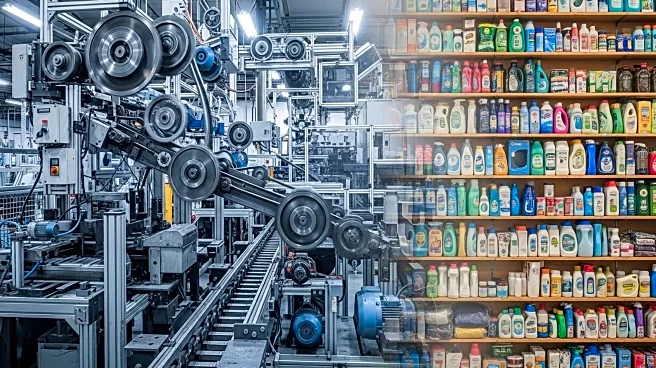What is the story about?
What's Happening?
A recent survey conducted by Bentley-Gallup reveals a significant disconnect between Americans' expressed support for U.S. manufacturing and their actual purchasing habits. The survey, which involved over 3,000 U.S. adults, indicates that while Americans increasingly view businesses as beneficial, skepticism remains regarding corporate intentions and their impact. Notably, 65% of respondents believe businesses positively affect people's lives, marking a 10-point increase since 2022. However, only 43% trust the intentions of businesses. The survey also highlights strong support for domestic manufacturing, with respondents urging companies to promote U.S.-made goods and support local communities and workers.
Why It's Important?
The findings of the Bentley-Gallup survey underscore both progress and challenges for corporate America. While there is a rising confidence in business, the results suggest a need for companies to bridge the gap between perception and performance. This is particularly crucial in delivering on promises that align with public values. The survey indicates that Americans expect businesses to go beyond profit-making and contribute positively to society. Understanding these expectations is vital for business leaders to navigate current economic and social challenges effectively.
What's Next?
Business leaders are encouraged to use the insights from the Bentley-Gallup survey to better understand public expectations and improve their strategies. Companies may need to focus on aligning their operations with societal values, promoting U.S.-made products, and strengthening community ties. This could involve reassessing corporate practices and enhancing transparency to build trust with consumers. As businesses strive to meet these expectations, they may face increased scrutiny from consumers and stakeholders demanding accountability and tangible contributions to society.
Beyond the Headlines
The survey results may prompt discussions on the ethical responsibilities of businesses in society. As public expectations evolve, companies might need to consider the long-term implications of their actions on community welfare and environmental sustainability. This shift could lead to a reevaluation of corporate priorities, emphasizing ethical practices and social responsibility as integral components of business success.















